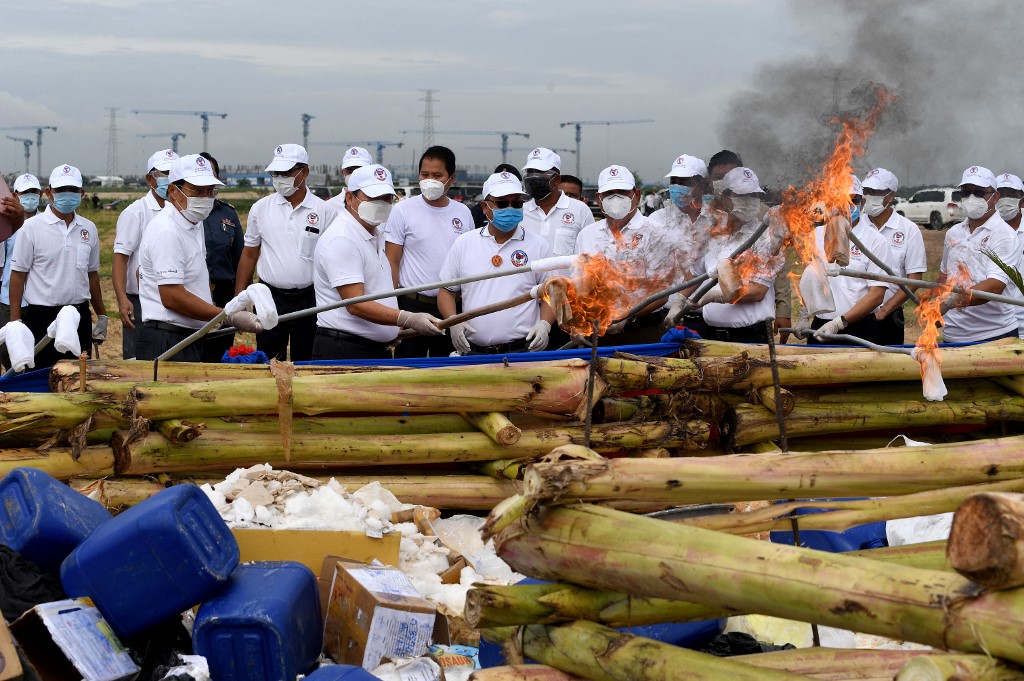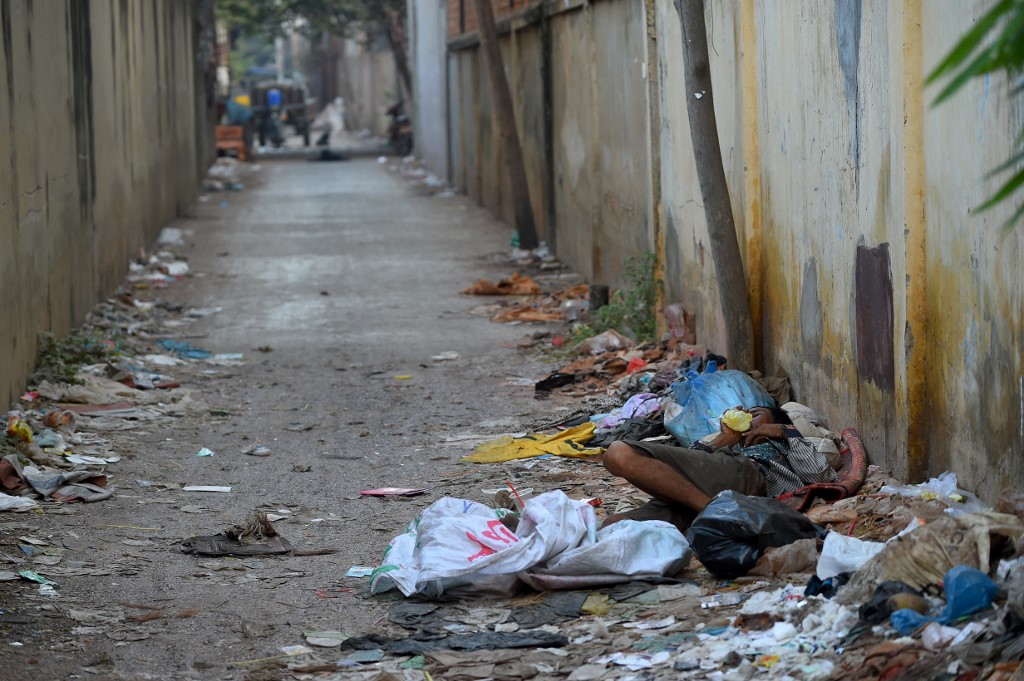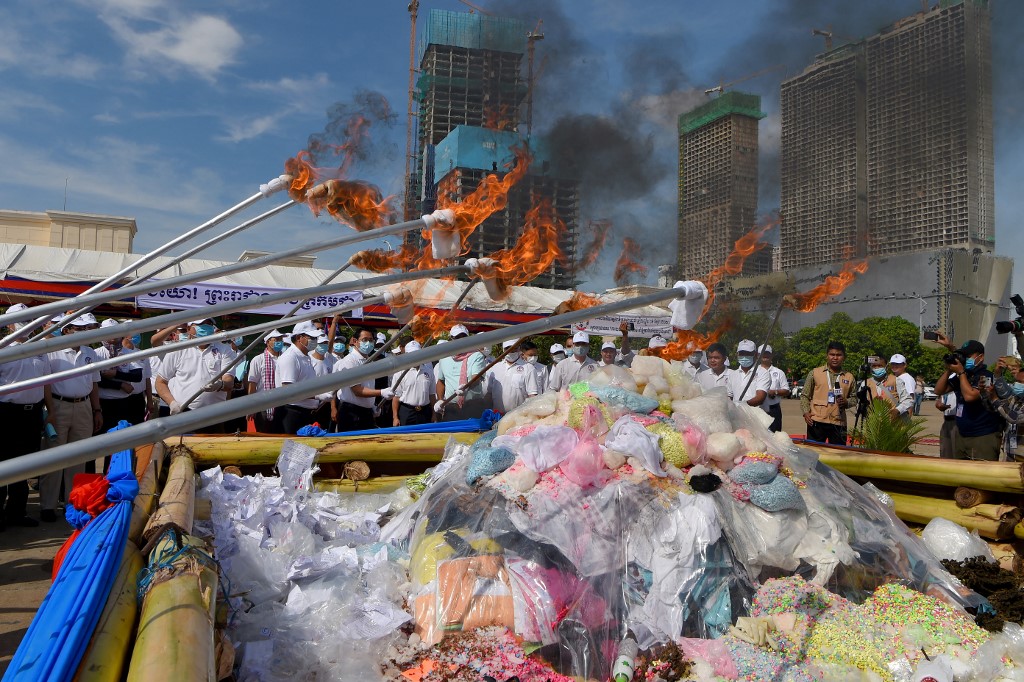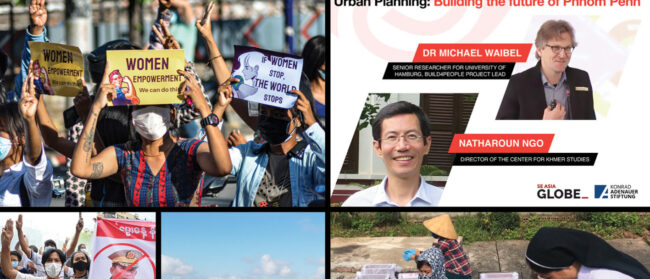Along Cambodia’s porous 435-kilometre coastline, three major ports support the lucrative shipping industry. Most shipping containers are coming to and from Bangkok and Singapore, but a more illicit business could soon have a major foothold – the region’s booming, multi-billion-dollar drug trade.
On a daily basis, traffickers across the region leverage a range of creative concealment methods, from packing narcotics into pig organs, noodles cartons and common tree nuts, to more sophisticated tactics such as lining large turbines with secret welded compartments and coating layers of liquified product onto rubber floor mats to avoid X-ray detection.
Since the onset of the Covid-19 pandemic, attempts to traffic massive quantities of high-grade crystal methamphetamine, heroin, ecstasy, ketamine and other synthetics using these and other methods have intensified, driven by Asia’s organised crime networks and their ability to adapt and innovate.
Yet while the business flourishes generally, widespread trade disruptions and heightened levels of uncertainty in the Golden Triangle – the area where Laos, Thailand and Myanmar meet – have syndicates contingency planning for whatever may lie ahead. In that, Cambodia appears to offer an attractive option not found elsewhere in the region.
Several red flags signal that there is a strategic geographic shift in organised criminal activity already underway. However, none of these are more telling than the latest developments in the regional drug trade.
Seizures of crystal meth in the Kingdom have soared this year, exceeding the combined total of the last four years
Representing the financial backbone of Asia’s organised crime groups, the production and trafficking of synthetic drugs in East and Southeast Asia generates an estimated profit of at least $71 billion annually, with meth alone generating $61 billion – four times as much as seven years ago. And while the lion’s share of production continues to happen in the lawless, militia-controlled borderlands of northeastern Myanmar, recent seizures indicate supply channels are diversifying to other parts of the lower Mekong, with syndicates setting their sights on Cambodia.
Seizures of crystal meth in the Kingdom have soared this year, exceeding the combined total of the last four years despite extensive border closures and the disruption of trade and transport networks in the wake of Covid-19. Cambodian authorities have also taken down several clandestine drug labs, with meth manufacture being reported in the country for the first time since 2014.
At the same time, the country has emerged as an important node in regional MDMA manufacture, with the number of dismantled labs totalling more than any other country in Southeast Asia over the past two years. There is a caveat here in that most were reprocessing and tableting sites where highly potent MDMA is ‘cut’ with various adulterants to create the drug ‘ecstasy’.
Also on the rise is the trafficking and transshipment of high-grade ketamine, culminating in a record near-half-tonne seizure in January on an island off the coast of Sihanoukville. But as illicit drug activity continues to surge across the country, the fact that syndicates are increasingly targeting Cambodia as their personal playground shouldn’t come as much of a surprise to anyone.

Asia’s organised crime groups are agile, opportunistic problem solvers with a proven ability to develop broad, strategic partnerships. This allows them to quickly shift trafficking routes and leverage creative chemistry to circumvent law enforcement and regulatory efforts. Like any other transnational enterprise, they prefer stable and predictable conditions in which to conduct their business.
Illicit drug production and other forms of organised crime are also known to migrate into places with deep governance problems, demonstrated by the shift to synthetics in the Golden Triangle following China’s crackdown on crime in 2014. And while it’s likely that syndicates operating in the region will continue to benefit from the reshuffling of law enforcement and border management priorities brought on by Covid-19 and the Myanmar coup, targeting Cambodia may be part of a calculated effort to hedge against risks associated with that changing business environment.
With that said, this potential shift to Cambodia represents much more than a response to Myanmar’s political turmoil. It is part of an ongoing Mekong expansion strategy that, if left unchecked, could enable organised crime to consolidate in yet another vulnerable part of the region.
While Cambodia has emerged as one of the most open and fastest growing economies in Asia, it has also been challenged by widespread organised criminality. Much of this is rooted in a lack of effective regulation. This is particularly apparent in the banking and financial sectors, as well as the country’s long standing patronage system – one fueled by capital, power and close, mutually advantageous relationships between business leaders and government officials.
In 2020, Transparency International ranked Cambodia the 18th most corrupt country in the world and worst in Southeast Asia, while the Basel Anti-Money Laundering Index designated it the 11th worst in terms of risk for money laundering globally. These risks have been further compounded by the country’s Chinese-led gambling boom and surging casino developments following a series of Chinese law enforcement campaigns that left Asia’s most notorious gambling industry in Macau displaced in 2014.
By 2020, a total of 193 casinos had been licensed to operate in Cambodia. In that time, once-quiet tourist towns such as Sihanoukville developed a higher casino density than the Las Vegas strip and were rendered a paradise for money launderers and organised crime.
Like many other parts of the formal economy, Cambodia’s runaway casino sector has shown growing signs of infiltration by major syndicates based in Macau, Hong Kong and Taiwan involved in the regional drug trade – especially online gambling, which serves as a critical piece of the supply chain by moving and laundering profits.
And while further expansion of Cambodia’s gambling industry has come to a halt as a result of Covid-19 travel restrictions and new regulations on licensing and management, including an official ban of online gambling, many of the Kingdom’s existing casinos continue to operate freely, flourishing in a grey zone of criminality as they service their clientele online.
As prices are driven down to new record lows amidst the deepest global economic downturn since the great depression, Cambodia’s youth population may become more susceptible to drug use
Beyond exploiting these optimal conditions for criminal finance, on Cambodia’s vast coastline syndicates also target the country’s excellent trade and logistics connections with neighbouring countries and regions.
As thousands of daily shipping orders flow in and out of the Bay of Kompong Som on large cargo barges, within a growing number of these consignments lie more illicit goods – those increasingly supplying the regional drug business with raw starting materials and lab equipment, as well as a premium finished product.
Last August alone, 1.9 tonnes of suspected methyl alpha-phenylacetoacetate (MAPA) and 600kg of 3,4-MDP-2P (PMK), two internationally controlled precursor chemicals with little legitimate use, were seized at a drug lab in Sihanoukville, likely shipped in through the city’s large international port. The port has also been used by traffickers to tranship meth produced in the Golden Triangle through Cambodia and on to destinations in the Philippines and Australia.
Alongside more than 50 loosely regulated special economic zones (SEZs), the country’s growing trade infrastructure, provides an invaluable strategic access that syndicates can utilise both in acquiring necessary precursors and targeting lucrative drug markets in East Asia and Oceania via maritime and air cargo trafficking. At the same time, Cambodia is also uniquely placed between two of the fastest growing meth markets in the region, Thailand and Vietnam, providing yet another set of convenient distribution channels for organised crime groups to tap into as they push product across long stretches of porous, unmanaged border.
The resulting situation is one which poses a considerable threat to the economic integrity and sovereignty of Cambodia and the Mekong region. It also carries severe implications for public health and security across the entirety of the Asia-Pacific, including Cambodia potentially becoming a major drug market itself if synthetics continue flooding the local market.
In turn, as drug prices are driven down to new record lows amidst the deepest global economic downturn since the great depression, Cambodia’s large youth population may become more susceptible to illicit drug use. With limited health infrastructure and treatment centres to cushion the blow, the consequences could prove devastating.

While all this may be true, given the long history of the Cambodian People’s Party (CPP) resisting action that would shed light on its own opaque operations, the question must be asked: Why should this time be any different?
After all, more than four years have passed since Prime Minister Hun Sen first declared Cambodia’s “war on drugs”, yet the underlying conditions enabling the Kingdom’s intensifying drug challenges have remained firmly intact as rising prison headcounts and mandatory treatment intakes steadily approach breaking point.
At this point, any plans for Cambodia to address transnational organised crime earnestly will be likely to stem from a mix of Chinese pressure and political opportunism ahead of next year’s local elections and the general election in 2023.
With respect to the former, in recent years China has applied a great deal of effort to curb the involvement of its citizens in cross-border criminal activities and organised crime in Cambodia, culminating in the first ever bilateral police cooperation centre established by the Chinese police in Phnom Penh in 2019. Targeting illegal gambling, drug trafficking, extortion and other crimes alongside its objective to dismantle so-called “mafia-like” networks, the initiative has had a considerable impact on the ground, with thousands arrested and extradited to China since it first became operational.
Perhaps more important, however, is the fact that Beijing’s growing political influence over Cambodia has shown encouraging signs of being able to move agendas on transnational organised crime at the highest levels of policy.
For instance, in an unusual show of police force on August 15, 2019, a Southern China Airlines flight carrying over thirty uniformed Chinese officers landed in Phnom Penh airport to liaise with Cambodian authorities for the handover of 74 Chinese nationals implicated in a telecom extortion scam targeting the mainland. Just days following the spectacle, Hun Sen publicly announced a permanent ban on new online gambling licenses, citing growing threats to security and public order in a bold move that would cost the country billions in foreign investment in containing the burgeoning, Chinese-led casino sector.
At Beijing’s urging, over the past year the CPP has also been compliant with supporting investigations related to China’s new “blacklist” of casinos and junkets that market gambling to residents on the mainland, where nearly all forms of gambling are prohibited. A notice issued in January by the Chinese embassy in Cambodia confirms this, sending a strong warning that the Cambodian government crackdown against online gambling and related criminal activity is stepping up.
As authorities now increasingly look to take down underground banks and agents moving and cleaning dirty money, as well as VIP junket groups offering gambling loans, proxy betting and luxury casino resort getaways to high rollers abroad, those exploiting the Cambodian system will undoubtedly be feeling the pressure.
Ordinary Cambodians have expressed growing dissatisfaction with their country’s soaring wealth inequality and corruption, as well as the dramatic increase in crime
That said, while this unprecedented new chapter in bilateral law enforcement cooperation represents an ongoing effort to preserve the economic security, social stability and national images of both countries, for the CPP, stepping up to address Cambodia’s drug and crime challenges should also be perceived as a major political opportunity.
In recent years, ordinary Cambodians have expressed growing dissatisfaction with their country’s soaring wealth inequality and corruption, as well as the dramatic increase in crime that has accompanied an influx of foreign nationals in resort towns like Sihanoukville, Poipet and Siem Reap. In response, following the last national election in 2018, the CPP led a politically opportunistic anti-corruption drive to purge the police and military, while also deporting thousands of mostly Chinese suspects in connection with criminal activity tied to the country’s unruly casino sector.
This past May, Hun Sen also ordered the creation of an inter-ministerial working group to evaluate the process of how Cambodia’s royal honorific oknha titles are awarded. While there is scepticism over what will change in practice, it’s a development that at least hints at increased scrutiny for the country’s once untouchable tycoon class as the CPP responds to a populist wave against economic elites, many of whom have been mired in scandal in recent years.
As several current oknha also hold proven links to some of Asia’s largest transnational drug trafficking networks, the CPP can use this as an opportunity to take down some major players in the regional drug trade operating in Cambodia, all while bolstering its populist narrative of being on the side of everyday people. This approach could also be transmitted into concrete action through Cambodia’s highly publicised upcoming ASEAN Chairmanship in 2022, although other geopolitical issues are likely to take priority.

All things considered, while some positive signs may have emerged ahead of the Cambodian elections, as well as through the growing influence of the country’s Chinese patron, it’s clear that any lasting solutions addressing the intensifying illicit drug situation will require a coordinated response that is more regional in nature.
First and foremost, governments in Southeast Asia and particularly those in the Mekong need to accept greater responsibility to assert the rule of law and take meaningful action against syndicates operating out of their jurisdictions. This is particularly important given how the region’s poorly governed yet well-connected financial systems and growing casino industries have emerged as major backdoors for Asian crime groups to launder their growing supply of dirty money. Leaders in countries like Cambodia will now have to determine how long these doors stay open.
At the same time, rapid economic growth and regional integration is increasing connectivity between production networks, suppliers and trade infrastructure, including ports and SEZs, effectively expanding opportunities for drug trafficking networks. For this reason, it is vital that governments like the CPP more effectively control chemical flows across their borders, requiring both interception of controlled substances and prevention of an increasingly diverse range of non-controlled pre-precursors from being diverted to illicit drug production.
Countries in the region also desperately need to enhance cross-border cooperation and intelligence sharing to drive concrete action, especially given the increasing movement of goods and people across long stretches of porous, mountainous jungle borders.
Among other measures – including broad, sustained investments in technology, forensic science and drug use prevention and treatment – these solutions will be integral to Cambodia’s success or failure against the booming illicit drug trade moving forward.
Anything less will be destined to fall short.
John Wojcik is an Associate Programme Officer at the United Nations Office on Drugs and Crime Regional Office for Southeast Asia and the Pacific in Bangkok, Thailand. The opinions expressed are the author’s own and do not reflect the views of the United Nations and other organisations.


